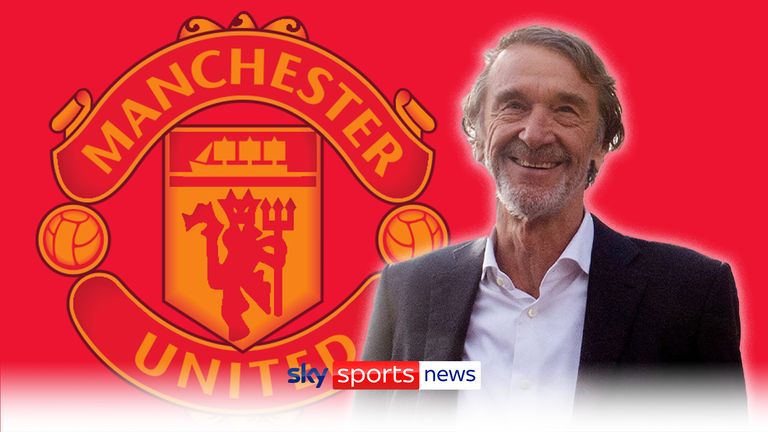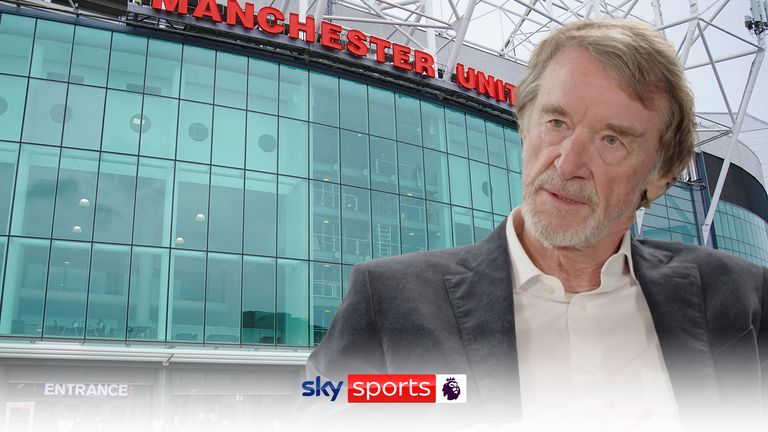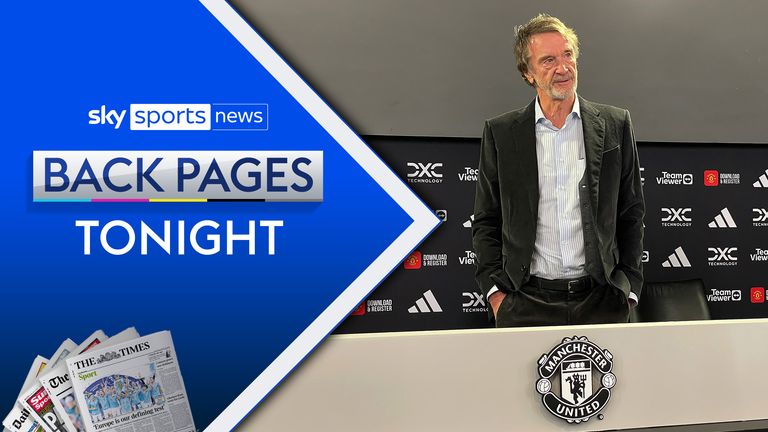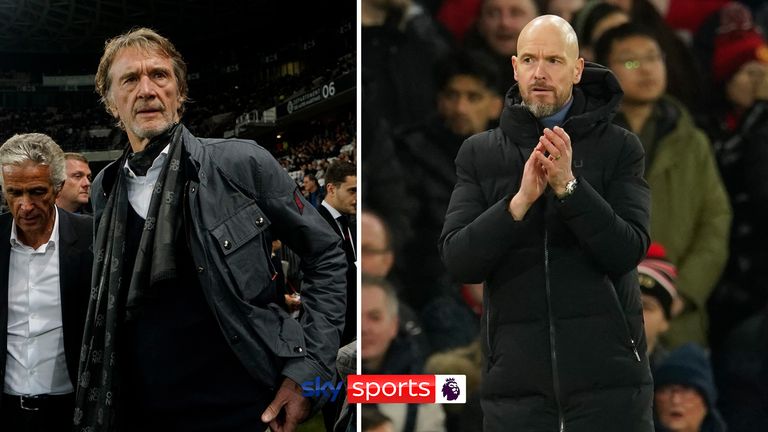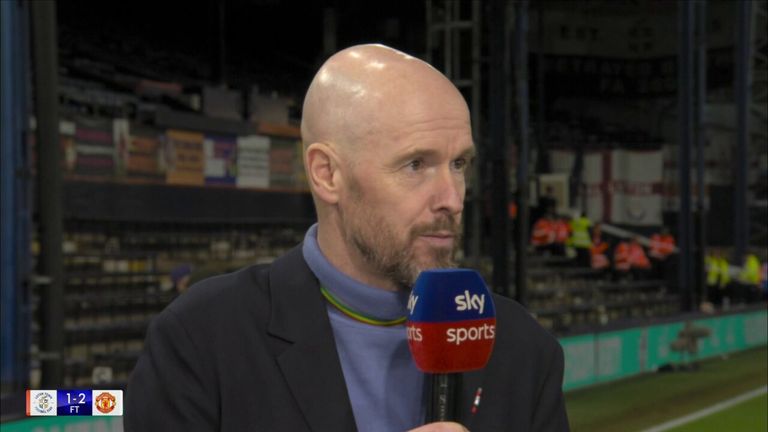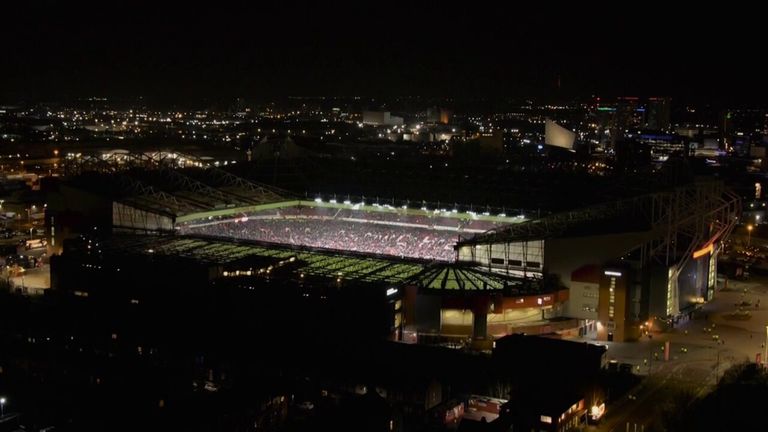Man Utd's new investor Sir Jim Ratcliffe: What did we learn from his first address?
Sir Jim Ratcliffe's minority stake of Manchester United was ratified this week; the British billionaire will take control of 27.7 per cent of the club and will control United's football operations; in a first address, Ratcliffe discussed Erik ten Hag's future, a new stadium and more...
Thursday 22 February 2024 19:51, UK
He is finally in the building. After the Glazer family first raised awareness of investment opportunities in Manchester United 18 months ago, Sir Jim Ratcliffe has announced himself as the club's new minority investor.
The British billionaire's deal to purchase 27.7 per cent of United was ratified this week, giving Ratcliffe and his INEOS group full control of United's football operations.
Ratcliffe appeared in front of the world's media for the first time since the deal was completed on Wednesday, outlining his full vision for the club and how his minority investment will work alongside the Glazer family.
- Ratcliffe completes deal to buy Man Utd minority stake
- Stream the Premier League on Sky Sports with NOW
- Watch free match highlights from every PL game this season
- Get Sky Sports | Download the Sky Sports App | Get Sky Sports on WhatsApp!
The 71-year-old discussed how he wants the club to compete again, what Erik ten Hag's future could look like and the plans for a new stadium...
Sky Sports analyses what we learned from Ratcliffe's first address - and what it could mean for United...
Ratcliffe's Fergie line boosts excitement - but he wants patience
The headline was written as soon as Ratcliffe said it. "There is nothing I would like better than to knock both of them off their perch," United's new investor said about Manchester City and Liverpool, who together have won every Premier League title since 2017.
It echoed Sir Alex Ferguson's line from the early 2000s, where he said his greatest achievement was stopping Liverpool's trophy dominance in the 1980s. Ratcliffe's ambition to break up City and Liverpool's recent success will only excite United fans.
But that comment was backed up by praise for United's two local rivals. "There are things we can learn from both of them," he added. "They have sensible organisations, great people within the organisations, a good, driven and elite environment that they work in."
Many reasons have been cited for United's on-pitch failures since Ferguson's retirement in 2013. One is a lack of structure at the top of the club - with United without a sporting director currently in place - a rarity for a club of their stature.
All the while, City and Liverpool's recent trophy success has followed the installation of a clear hierarchy that is fully aligned.
No situation better summed up United's failings in this department than Ralf Rangnick claiming he did not know what Darren Fletcher's role was at the club, despite being officially termed as a 'technical director'.
So Ratcliffe is moving quickly to bring in new chief executive Omar Berrada - coincidentally poached from City - and new sporting director Dan Ashworth from Newcastle. Another former City chief, Southampton's Jason Wilcox, is also being targeted.
But despite this desire to swiftly install a new structure, Ratcliffe has called for patience. "It's not a light switch," he said. "It's not one of these things that changes overnight.
"We have to be careful we don't rush at it in a way, you don't want to run to the wrong solution rather than walk to the correct solution."
Ten Hag will be backed…
New ownership tends to result in a change in manager, just look at the last two high-profile examples. Todd Boehly sacked Thomas Tuchel 100 days into his reign at Chelsea, Steve Bruce was jettisoned by Newcastle's Saudi Arabia ownership just a fortnight after their takeover was completed.
With Manchester United out of the Champions League and outside of the top-five spots, Ratcliffe could have been tempted to bring in his manager - like those at Chelsea and Newcastle have done.
But it appears the Dutch manager may not be going anywhere yet - he may be given a chance to prove himself in a new United era.
"If you look at the 11 years that have gone since David Gill and Sir Alex have stepped down, there have been a whole series of coaches, some of which were very good - and none of them were successful, or survived for very long," Ratcliffe said.
"And you can't blame all the coaches. The only conclusion you can draw is that the environment in which they were working, didn't work. And Erik's been in that environment."
After all, Ratcliffe's desire to improve the environment echoes Ten Hag's own comments from earlier this season. The Dutchman said he was appointed by the United hierarchy to improve the culture - as there was not one before he took over in 2022.
Disciplinary issues such as those involving Marcus Rashford and Jadon Sancho have remained this season - but could Ratcliffe be the key figure that Ten Hag was always looking for?
…but how long will Ten Hag be given?
However, Ratcliffe was not going to completely give Ten Hag a free pass. United are on a four-game winning run, but the INEOS owner was adamant that this does not define success.
"The squad has played some really good football over the last couple of months, but it's not at the level we want to get to," he said.
Again, it echoes a common Ten Hag catchphrase of "good is not good enough" - but if United fail to qualify for the Champions League next season - what would it mean for the Dutchman's future?
What is clear from Ratcliffe's latest comments is that the sporting project will take priority over the commercial side of the club - which was not always the case under previous regimes.
"This is going to be a very sports-led club, it's all going to be about performance on the pitch," he said.
"We're really clear that football will drive the club. If we're really successful at football, then commercial will follow. And we'll make more money. Our only focus is performance on the pitch.
"I think the ultimate target for Manchester United - and it's always going to be thus, really - is that we should be challenging for the Premier League and challenging for the Champions League. It's one of the biggest clubs in the world.
"There are six, in my view, who are probably the six biggest clubs in Europe - three in the north west, two in Spain and one in Germany. United should be in that small group. It hasn't been for a while.
"And so, therefore, it must be challenging for the Premier League. And if we're not, then in a way, we're not doing what we are saying we ought to do."
Man Utd will finally get a face-to-face figure
Protests against the Glazer family's ownership have been mainly centred around their silence and lack of investment in the club.
Last September, the Manchester United Supporters' Trust (MUST) described the Glazer's running of the club as "slow and opaque".
What Ratcliffe has promised the United fans this time is they will be present in their running of the club - a clear difference to what the supporters have seen under the Glazer regime.
"We're obviously going to be on the ground, whereas the Glazer family are a fair way away," he said.
"So I don't see an issue in us being able to influence the club in all the right ways going forward, to be honest.
"There's a fair amount of trust, I think, between those two parties. And they [the Glazers] are obviously very comfortable with us running the sports side of the club."
Is a north vs south divide emerging now?
The wheels are already moving on a new Manchester United stadium. Last week, Trafford Council announced a 15-year plan to regenerate the area around Old Trafford, Ratcliffe says a "small task force" will be assembled next week to start gathering opinions on what the stadium project looks like.
Sky Sports pundit Gary Neville could be part of those conversations, according to the INEOS owner.
But what Ratcliffe did mention in his media briefing was how he wants to build a 'Wembley of the North' - a stadium to rival London's national stadium. It could lead to a tug of war between Wembley and Man Utd's new stadium for events such as the FA Cup final and the Champions League final.
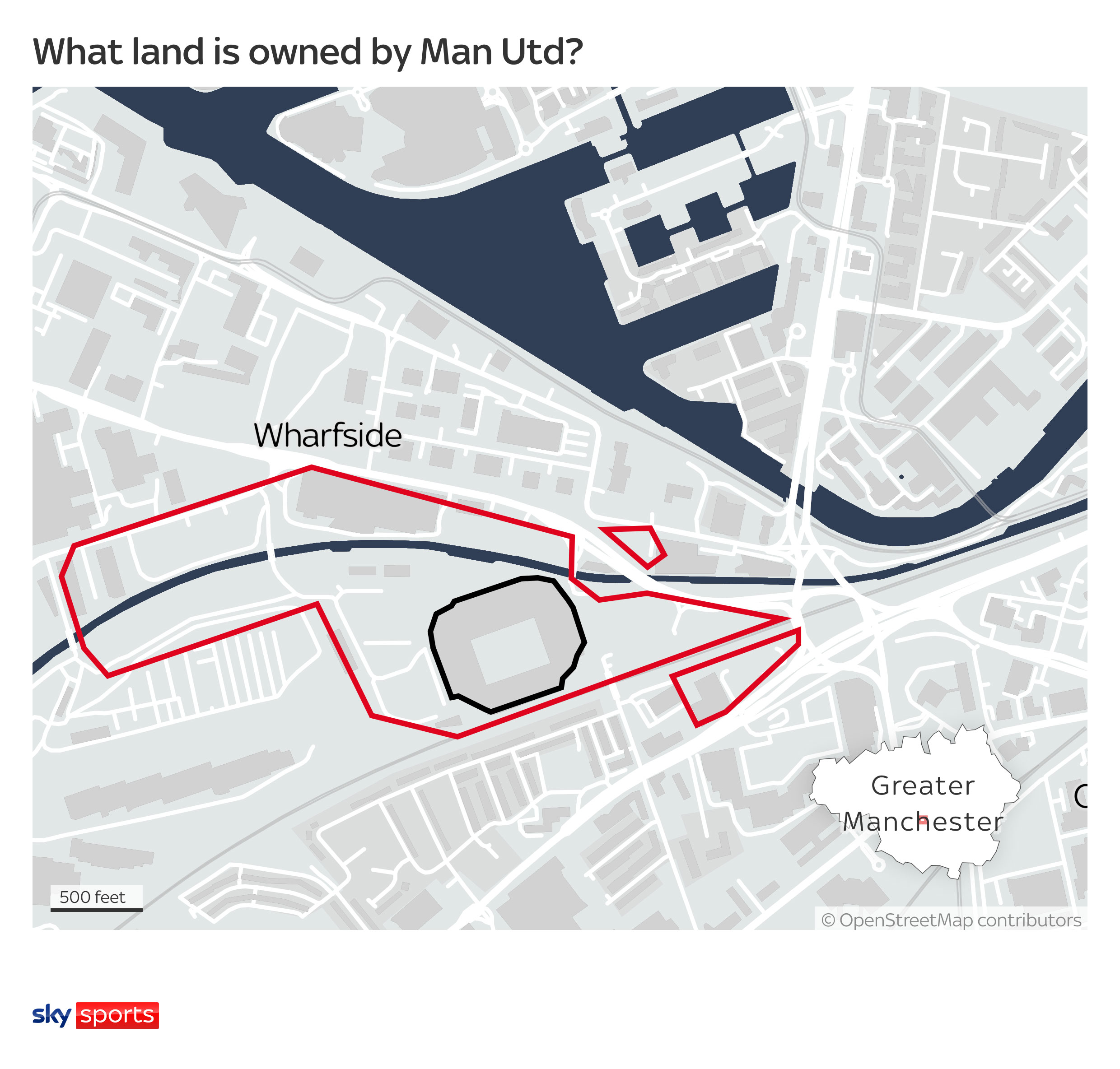
"The people in the north pay their taxes like the people in the south pay their taxes," Ratcliffe said. "But where's the national stadium for football? Where's the national stadium for rugby? Where's the national stadium for tennis? It's in the south. Where's the national concert stadium? It's The O2, it's in the south. Where's the Olympic Village? It's in the south.
"Where is the stadium in the north? How many Champions Leagues has the north west won and how many Champions Leagues has London won? The answer to that is the north west has won 10 - Liverpool have won more than us - and London has won two.
"In an ideal world you want a stadium in the north, a stadium of the north, which would be a world-class stadium where England could play and you could have the FA Cup final and it's not all centred around the south of England."
Despite being the largest club stadium in England, Old Trafford was not selected as a host venue for the Euro 2028 tournament taking place in the UK and Ireland. It last hosted the Champions League final in 2003 - Wembley has been handed that showpiece event three times since then.


